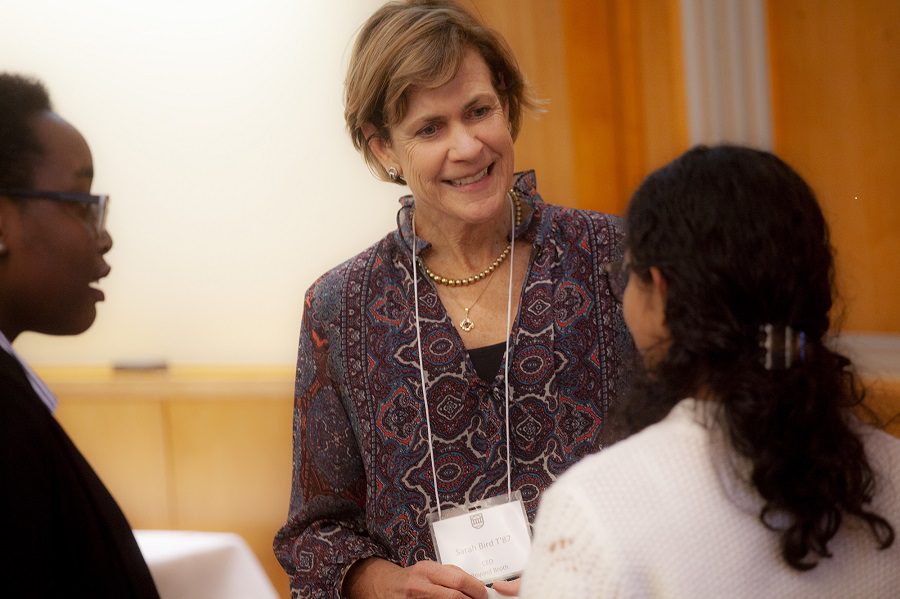News Roundup – Agility in Marketing at Tuck, Rady Professor Conducts Uber Study, and More

Let’s take a look at some of the biggest stories from this week, including the Tuck Marketing Symposium, impeachment hearings, more.
Agility is the Theme at the Tuck Marketing Symposium – Tuck School of Business News
Students from Dartmouth University’s Tuck School of Business recently led a marketing symposium, organized in partnership with the Forbes CMO network. The theme was one which applies to the students’ experience starting out in the business world to the companies at which they’ll work – agility. Alumni executives from Wayfair, Colgate-Palmolive, and Beyond Broth all shared their thoughts on how the field of marketing has shifted, and what newly minted MBAs might be able to bring to the table.

In her opening remarks to the symposium, Deputy Dean Punam Anand Keller says, “The beauty of marketing is you can use it in any career … I use it all the time as deputy dean. It’s an amazing skill that’s extremely portable.”
The concept of agility was framed within discussions of the rapidly changing post-digital revolution world. Topics included the impact of omnichannel retailing and social media. The question of “Are Big Brands Dead?” initiated a talk by Dana Medema, the General Manager for Home Care North America at Colgate-Palmolive. The discussion involved the rising competition and integration of startups into the dominant landscape of long established brands.
Chris Fuqua (Tuck ’06) is the CEO of the healthy restaurant chain B.Good gave a talk called “Managing in a Changing Environment” in which he addressed how his product could be made accessible and appealing in a highly competitive market.
“Managing in a changing environment is a way to differentiate yourself as a leader. It’s not just about what you learn in textbooks, but how you respond to challenges,” says Fuqua. You can read more about the Tuck Marketing Symposium here.
Through Fellows Program, Graduate Students Have Voice in Innovation Campus Plans – Virginia Tech News
Ten Virginia Tech graduate students, including one from Pamplin’s Business Information Technology Master’s program, have been officially named as Innovation Fellows. They were chosen from more than two dozen applicants to help to define and shape the school’s new Innovation Campus in Alexandria.
The fellows will offer input and advice as the campus develops, as well as share perspectives and participate in events classes begin there next year.
“The fellows will help us understand what is important to graduate students,” says Brandy Salmon, Innovation Campus’ Managing Director.
“We are so excited to have them onboard, helping us stay connected to those who matter most—our students. With their fresh ideas and feedback, we will create a better educational experience for future students [at the Campus],” Salmon continues.
Among the input already offered to the Campus planning team was to offer discounts to students for the many services that will be offered, such as dining and retail, in the surrounding areas. Ronald “Angel” Cox, Business Information Tech fellow, says, “When I read about the campus, it was everything I wanted … The idea of a campus acting as an incubator for fostering ideas and partnering with private companies is a culmination of everything I have pursued in my own career.”
Read here for more on the Innovation Fellows and the new campus.
Uber Study by Rady Professor Gets the Internet Buzzing About Tips – Rady School News
Uri Gneezy, UC San Diego Rady School of Management Professor in Management Leadership, opened up a widespread conversation when he published a working paper on the nature of tipping in today’s on-demand economy.
The team specifically studied tipping data from Uber. Along with his co-authors, Gneezy studied 40 million trips during four weeks in August and September 2017. Some of the factors that they examined were characteristics of the drivers and riders, location, ride quality, and timing of the rides.
The study discovered that a majority of riders, around 60 percent, never tip, and only about 1 percent consistently do. Whether or not there is a tip is dependent more upon the rider than the driver, but safety and promptness were also obvious reasons for tipping. Other factors the team found included destination, star rating, the time of day, and gender.

Andrew Van Dam of The Washington Post remarks, “We all have theories or stereotypes about who tips best and which workers earn the most, but honest-to-goodness tipping facts are rare.”
Major news outlets such along with The Washington Post, such as The Economist, Wired, and The Daily Mail shared the paper, as did millions of Twitter users. For the original paper, entitled The Drivers of Social Preference: Evidence from a Nationwide Tipping Experience, read here.
Harper Family Foundation Gives $10 million to Chicago Booth to Increase Scholarship Funding for Veterans – Chicago Booth In the News
The Harper Family Foundation, founded by Chicago Booth alumnus Charles “Mike” Harper (’50), has donated a generous gift of $10 million in scholarship assistance for current and former members of the Armed Forces in Booth’s full-time, Evening, Weekend and Executive MBA programs.
Harper’s son, Dr. Michel Harper, says, “This gift fits nicely with my father’s personality and his allegiance to both the country and the military … The whole purpose of our foundation is to make transformative investments that encourage and reward leadership, supporting an individual’s path to success so they may amplify their potential.”
Chicago Booth is a proud participant in the Yellow Ribbon Program, which allows universities to enter into an agreement with the U.S. Department of Veterans Affairs in order to fund tuition and fee expenses. Since 2006, Booth has seen an enormous increase—300 percent—in the number of veterans in the MBA program. This is due in major part to the school’s efforts to recruit veterans.
Madhav Rajan, Chicago Booth dean and Professor of Accounting, says of the gift:
“Military veterans are a great asset to the Chicago Booth community. The experience, commitment to service and maturity that they bring are incredibly valuable to us … We are grateful to the Harper Family Foundation, whose generous gift will allow more veterans to benefit from a Booth education.”
You can read here for more on the Chicago Booth donation.
Republican Impeachment Counsel is a Lehigh MBA Graduate – The Allentown Morning Call
Attorney Steve Castor, a Philadelphia-area native and Lehigh College of Business and Economics MBA grad, will take a large responsibility for examining witnesses during the public presidential impeachment hearings that began this week.
Castor first made national news during the closed door sessions of the hearings. Castor revealed the name of a whistleblower during his questioning of Lt. Col. Alexander Vindman, a national security adviser to President Trump. This was the first time the name was publicly shared.

Jason Chaffetz, a Fox News pundit and former Republican congressman, says to the Daily Beast, “Castor has the institutional knowledge, experience and prowess to be the guy in the hot seat … Most of the public hasn’t seen him but for a photo of him in the background whispering to the chairman or a ranking member. But behind the scenes, he’s been doing these types of inquiries for years.”
Castor, who also earned his J.D. at George Washington University, has participated in several other high profile hearings. These included an investigation of the Justice Department’s selling of illegal firearms to track gun traffickers, along with the Internal Revenue Service’s involvement with conservative groups. For more on Castor and his background, read here.
These LA Business Schools Are Helping Low Income Students Pursue Their Dreams

For many low-income applicants, unfortunately, the cost of an MBA program is just out of reach. That’s because, by the time you count tuition (often upwards of $80,000), boarding and books ($40,000), and other expenditures, the average cost of an MBA is around $140,000 according to Investopedia. And that’s all before you count lost salary for two years for a full-time MBA program.
What can you do?
For low-income MBA applicants in Los Angeles, California you don’t have to give up on your dreams due to money. Instead, business schools offer many options to help pay for your MBA program.
California DREAM Act
The California DREAM Act of 2011 is currently available to California residents who attended and graduated from high school in the state and are enrolled in an accredited California Institution of Higher Education. If you meet these eligibility requirements, you’ll be given access to California State financial aid and scholarships as well as specific university financial aid programs. In addition, need-based graduate applicants are eligible for the State University Grant (SUG) program, which awards up to $7,176 to help cover tuition.
California State University’s Long Beach College of Business Administration is just one of the MBA programs that provides this type of financial aid to low-income MBA applicants. The College of Business Economics at Cal State L.A. also accepts DREAM Act Applications for student financial aid.
Scholarships
MBA scholarships for low-income applicants are one of the best ways to help pay for your degree program. Scholarships vary by school and can range from a few thousand dollars per year to full-tuition coverage plus a stipend.
At the UCLA Anderson School, there are six unique fellowships available to MBA applicants.
- Donor Fellowships are awarded to MBA applicants based on professional development, intended career, community involvement, and/or financial need.
- Merit Fellowships are awarded based on the strength of a student’s application.
- External Fellowships are available for a variety of different situations and students. One example is the Girard Miller Foundation scholarship, which is awarded to a graduate student preparing for a career in state or local government finance.
Teaching Assistantships
For California MBA students, financial aid doesn’t stop in the first year. For second-year full-time MBA students, many Los Angeles business schools offer Teaching Assistantship (TA) positions. These positions are usually awarded to students who keep their grade point averages above a certain level and who apply and receive an appointment. The award amount varies by business school but, in some cases, covers 100 percent of a student’s services fee and tuition.
At UC Irvine’s Paul Merage School of Business, full-time MBA students who gain a TA appointment receive payment for 100 percent of their Graduate Student Health Insurance Program (GSHIP) premium. They also receive 100 percent of the Student Services Fee and Tuition components per quarter.
Military Veteran Aid
For low-income MBA applicants who also have a history of military service, there are many unique financial aid opportunities. The exact services available will depend on the school, but some of these programs are available at schools across California and the U.S.
First, there’s the Yellow Ribbon Program, which many Los Angeles business schools take part in, including Chapman University Argyros School of Business. This program awards MBA students up to $6,000 for tuition and fees. Another program open to military veterans is the Post-9/11 GI Bill, which includes payments directly to the university for tuition and fees, a monthly housing allowance, and an annual books and supplies stipend up to $1,000 per year.
Individual schools like the USC Marshall School of Business also offer their own specific scholarships for military veterans. The Schoen Family Scholarship Program for Veterans is available to full-time MBA students at Marshall and has, to date, provided a staggering $1.2 million in financial support to 173 students at the university.
Loans
Finally, most low-income MBA applicants in Los Angeles are eligible for federal student loans. Direct PLUS Loans are available to graduate students to help pay for educational expenses up to the cost of attendance. MBA students can request unsubsidized loans up to their full eligibility with an Income-Driven Repayment Plan that allows you to make payments based on your adjusted gross income. In most cases, payment will begin until after graduation.
For MBA applicants at Pepperdine University’s Graziadio School of Business and Management, financial aid loan application for Federal Graduate PLUS student aid and Federal Direct Stafford Loans is easy. The school provides loan counseling for graduate student borrowers, loan calculators, and more.
For more information about how your business school could help cover the cost of your MBA program, visit your school website and contact their financial aid office. Scholarships, loans, and aid opportunities vary per school. The Simple Dollar also has a handy guide on how DACA recipients may be able to handle financial expectations for students around the U.S.
The Best Business Schools For NYC Veterans

The transition from boot camp to business school need not be such a leap for veterans of the U.S. Armed Forces. There are a number of MBA scholarships in place specifically designed to help relieve and in certain cases absolve the financial burden of business school tuition for veterans.
The Best Business Schools for Philadelphia Veterans

Veterans are no strangers to challenge–particularly those who have decided to pursue their MBAs in today’s highly competitive job market. Vets, many of whom face the difficulties of making the transition back into civilian society after their military service, are fortunate to have the support of highly specialized programs in some of the country’s top business schools.
The Philadelphia metro has some exemplary programs for former service men and women. Here is a closer look at several of them.
Argyros Student Shares Advice for Veterans

Argyros School of Business student Jonathan David Chandler gives advice on the Chapman University blog about education benefits for military members. Chandler explains that there are several common misconceptions about the educational benefits that are available to current and past military members.
Chandler explains that the most common benefit for military members today is the Post-9/11 GI Bill. The GI Bill covers all in-state tuition and fees at public degree granting schools, but in some cases it may not cover all private schools and out-of-state tuition. In order to cover the off set of tuition, the Yellow Ribbon Program was created. Not all schools participate in this Yellow Ribbon Program.
